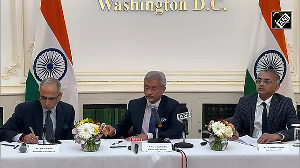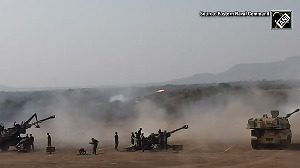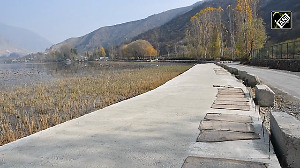Favouring a "revolutionary change" in relations with India, Nepalese Prime Minister Prachanda on Tuesday said a "new era has dawned" that should help further strengthen the bilateral ties.
He suggested that New Delhi should help in the development of Nepal, which is placed in between two rising economies -- India and China.
The former Maoist leader, whose real name is Pushpa Kamal Dahal, said his country is committed to laying the foundation of stronger bilateral ties with India.
"I am going back to Nepal as a satisfied person. I will tell Nepali citizens back home that a new era has dawned," he said addressing a gathering at a lunch hosted by Janata Dal-United leader Sharad Yadav here in his honour.
"Time has come to effect a revolutionary change in bilateral ties. On behalf of the new government, I assure you that we are committed to make a fresh start," said Prachanda, who has been favouring reshaping of the relations.
He had held wide-ranging talks Prime Minister Manmohan Singh on Monday.
Citing the economic progress in India and the "far-reaching changes" in Nepal, he said, "There is a need to qualitatively improve the relationship. New dynamism needs to be infused in the relationship. New Nepal is keen to develop new relations with India."
He said in an effort to take this relationship forward "we need to, as per the rules of progress, take a break from the continuous process and make a stronger beginning to further strengthen this relationship."
The first Nepalese prime minister after abolition of monarchy there said he understands the security concerns of India.
"India is making rapid progress. China too has a higher growth rate. Nepal is in between these two countries and if there is no development in Nepal, it is going to be a problem," he said, adding, "India has to pay attention to this aspect."
Prachanda, who led a decade-long armed agitation against the monarchy before joining the political mainstream last year, said, "The foundation of the peace process was laid in India. That is why we have a unified responsibility to take the peace process forward."
On his discussions with Dr Singh and other political leaders in Delhi, he said, "I tried to make a point. There was a continuation in Nepal... continuation of a system in Nepal. We broke the continuation and initiated a new process, which we are trying to establish."
He said the continuation in Nepal-India relations also needs to be broken so that there could be "a fresh start".
Noting that Indo-Nepal relations have been cordial and unique, he said, "To take this relationship forward, we need to, as per the rules of progress, take a break from the continuous process and make a stronger beginning to further strengthen this relationship."
In this regard, he cited certain issues, including water sharing, border management, economic development and security matters which needed to be looked into.
"I have taken a tough line and announced that Nepal's soil will not be allowed to be used for activities directed against any nation," the former Maoist leader said.






 © 2025
© 2025